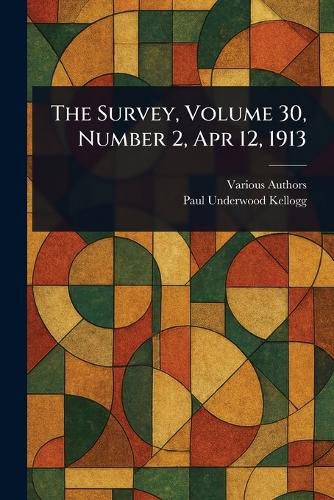Readings Newsletter
Become a Readings Member to make your shopping experience even easier.
Sign in or sign up for free!
You’re not far away from qualifying for FREE standard shipping within Australia
You’ve qualified for FREE standard shipping within Australia
The cart is loading…






This title is printed to order. This book may have been self-published. If so, we cannot guarantee the quality of the content. In the main most books will have gone through the editing process however some may not. We therefore suggest that you be aware of this before ordering this book. If in doubt check either the author or publisher’s details as we are unable to accept any returns unless they are faulty. Please contact us if you have any questions.
Explore a vital snapshot of early 20th-century America with "The Survey, Volume 30, Number 2, Apr 12, 1913." This meticulously reproduced periodical offers a window into the social conditions and pressing issues of the time, providing valuable insights into the era's efforts toward social reform and civic engagement.
Delve into a collection of essays and sociological observations that capture the spirit of social surveys and movements aimed at understanding and improving life in the United States. This volume provides a detailed look at the challenges and aspirations of a nation grappling with rapid change.
A significant resource for those interested in American history, social work, and the evolution of social science, "The Survey" offers a primary source perspective on the complexities of early 20th-century American life. This edition preserves the original content, allowing readers to engage directly with the voices and perspectives that shaped conversations about social justice and community development.
This work has been selected by scholars as being culturally important, and is part of the knowledge base of civilization as we know it.
This work is in the public domain in the United States of America, and possibly other nations. Within the United States, you may freely copy and distribute this work, as no entity (individual or corporate) has a copyright on the body of the work.
Scholars believe, and we concur, that this work is important enough to be preserved, reproduced, and made generally available to the public. We appreciate your support of the preservation process, and thank you for being an important part of keeping this knowledge alive and relevant.
$9.00 standard shipping within Australia
FREE standard shipping within Australia for orders over $100.00
Express & International shipping calculated at checkout
This title is printed to order. This book may have been self-published. If so, we cannot guarantee the quality of the content. In the main most books will have gone through the editing process however some may not. We therefore suggest that you be aware of this before ordering this book. If in doubt check either the author or publisher’s details as we are unable to accept any returns unless they are faulty. Please contact us if you have any questions.
Explore a vital snapshot of early 20th-century America with "The Survey, Volume 30, Number 2, Apr 12, 1913." This meticulously reproduced periodical offers a window into the social conditions and pressing issues of the time, providing valuable insights into the era's efforts toward social reform and civic engagement.
Delve into a collection of essays and sociological observations that capture the spirit of social surveys and movements aimed at understanding and improving life in the United States. This volume provides a detailed look at the challenges and aspirations of a nation grappling with rapid change.
A significant resource for those interested in American history, social work, and the evolution of social science, "The Survey" offers a primary source perspective on the complexities of early 20th-century American life. This edition preserves the original content, allowing readers to engage directly with the voices and perspectives that shaped conversations about social justice and community development.
This work has been selected by scholars as being culturally important, and is part of the knowledge base of civilization as we know it.
This work is in the public domain in the United States of America, and possibly other nations. Within the United States, you may freely copy and distribute this work, as no entity (individual or corporate) has a copyright on the body of the work.
Scholars believe, and we concur, that this work is important enough to be preserved, reproduced, and made generally available to the public. We appreciate your support of the preservation process, and thank you for being an important part of keeping this knowledge alive and relevant.